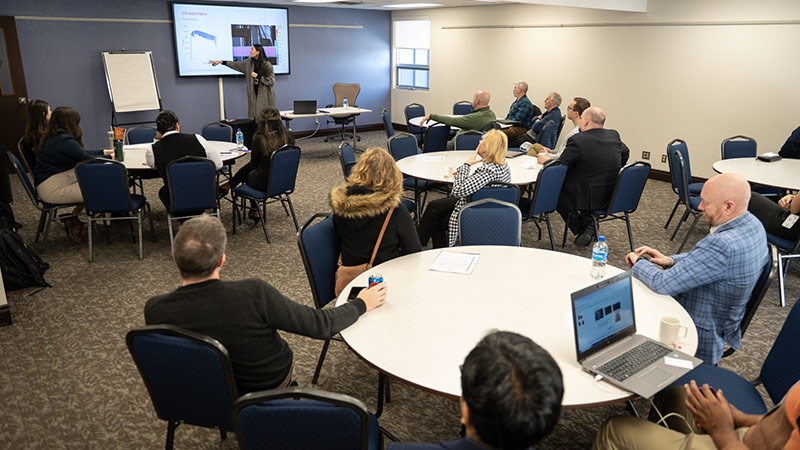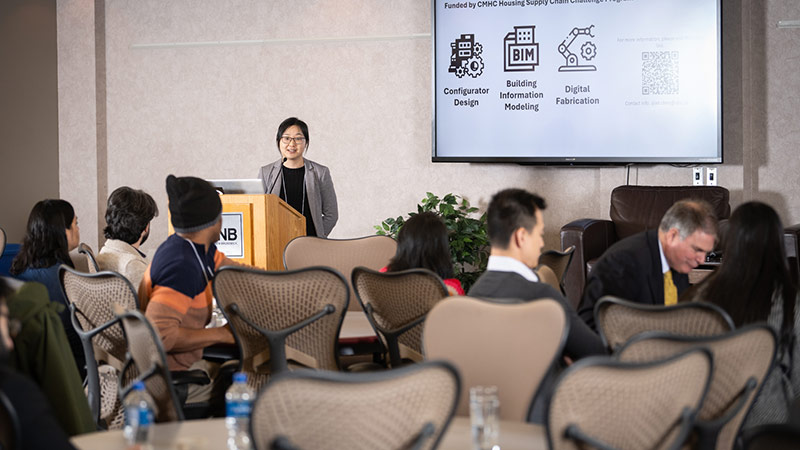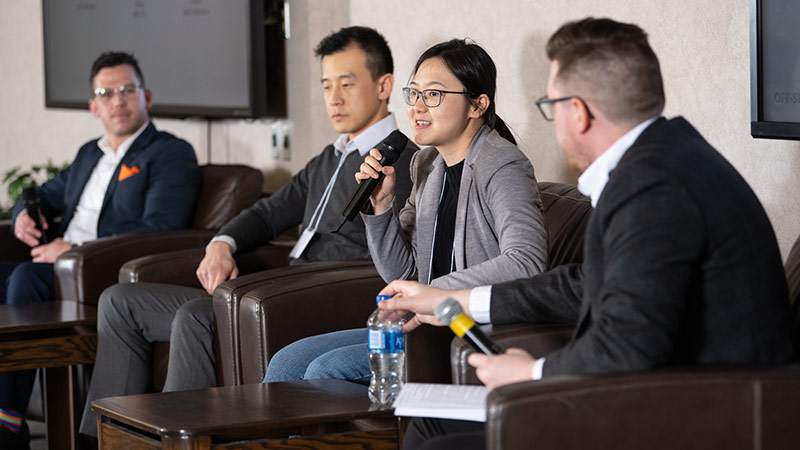Off-site accelerate 2024: A recap of the OCRC Research Symposium
Author: OCRC
Posted on Feb 21, 2024
Category: Events

The Off-site Construction Research Centre (OCRC) recently hosted its inaugural research symposium, Off-site Accelerate 2024, bringing together a diverse array of researchers, industry professionals and students to showcase innovative research and discuss the future of off-site construction. The symposium served as a platform for exchanging knowledge, fostering collaboration and exploring emerging trends in the construction industry. Here’s a recap of the insights shared by our team members who attended the event.
Favourite presentation
Julia Holgate: Kate and Benson’s presentation on self-aligning bolted connections stood out to me. Their work not only addressed tolerance errors in connecting precast wall panels but also delved into seismic considerations, highlighting the intersection of technology and safety in construction.
Brandon Searle: my favourite presentation, presented by Sanya Sahni, was Using Deep Learning to Auto-Digitize Architectural Floor Plan for Effective 3D Representation. Sanya and the team have been actively developing this tool for over a year which began with support from the New Brunswick Innovation Foundation and in-kind contributions from Bird Construction. The possibilities with this tool are endless, and we are excited to see where this project leads.
Erin Pollard-Feehan: Julia Holgate’s presentation on Ultra High-Performance Concrete as a building material stood out for its potential to address the housing crisis in Nunavut. Her research exemplifies the significance of interdisciplinary collaboration in tackling complex societal issues.
Sadaf Montazeri: One of the standout presentations for me was the discussion on using Deep learning to auto-digitize architectural floorplans for effective 3D representation by Sanya Sahni. The presenter provided insightful perspectives on the importance of leveraging advanced technologies such as deep learning to streamline the digitization process of architectural floorplans, thereby enabling more efficient and accurate 3D representations of buildings. This innovative approach not only enhances visualization capabilities but also holds great potential for improving communication among stakeholders, facilitating better decision-making, and ultimately driving greater efficiency and effectiveness in architectural design and construction projects.

Key takeaways
Julia Holgate: The housing crisis in Canada underscores the urgency of promoting off-site construction practices. Efforts to bolster the off-site construction industry are crucial for addressing housing shortages while advancing sustainability goals.
Zhen Lei: The interdisciplinary nature of the research presented at the symposium was striking. Collaboration across diverse backgrounds is essential in addressing the multifaceted challenges of the construction industry.
Brandon Searle: The symposium had a plethora of important messages and key takeaways, a few for me included.
- Our industry, particularly in the Atlantic Region, is keen to work on R&D to move the sector as a whole – this was demonstrated by 67% of the audience being from the public and private sector.
- The National Research Council is eager to work with industry, identify problems and find solutions that will ultimately increase productivity and decarbonize the sector at scale.
- If you have a good idea or a problem to be solved, there are researchers in the academic community that are eager to solve them, and grant funding available to support the industry through their innovation journey.
Erin Pollard-Feehan: The symposium provided valuable insights into the integration of off-site practices with traditional construction methods. It offered a well-balanced platform for learning, networking, and exploring the latest research in off-site construction.
Sadaf Montazeri: One key takeaway from the symposium was the emphasis on collaboration and interdisciplinary approaches in addressing existing challenges in the construction industry. It was inspiring to see researchers, industry professionals, and policymakers coming together to exchange ideas and explore innovative solutions.

Event insights
Julia Holgate: The symposium facilitated meaningful dialogue between academia and industry, bridging gaps in knowledge and fostering collaboration. It provided a valuable opportunity for researchers to showcase their work and engage in discussions with industry stakeholders.
Brandon Searle: Overall, the event was a success – having Dr. Trevor Nightingale from the NRC Construction Research Centre was a highlight, and we hope that those attending take advantage of the connections made and continue to look for new methods and avenues to improve the sector.
Sanya Sahni: The symposium was characterized by curiosity, creativity, and enthusiasm, with attendees actively engaging in discussions and exploring potential collaborations. The presentations sparked interest and excitement among participants, paving the way for future industry collaboration.
Sadaf Montazeri: Overall, the event was a stimulating experience, offering a platform for meaningful dialogue and knowledge-sharing, fostering connections and collaborations that have the potential to drive positive change in the construction sector. I look forward to future events and continuing the conversation on advancing sustainability and innovation in construction.
In summary, Off-site Accelerate 2024 was a resounding success, showcasing groundbreaking research and fostering collaboration between academia and industry. The event underscored the importance of innovation, sustainability, and collaboration in driving the future of off-site construction. As we reflect on the symposium, we look forward to continued collaboration and invite all those who attended to participate in the Transforming Construction with Off-site Methods and Technologies (TCOT) conference this August 2024.